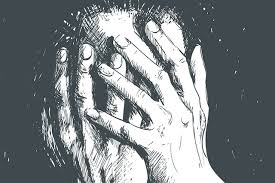We frequently hear about the intimate relation between addiction and shame, and many of us have experienced it. But what is the subjective feeling of shame that makes it not only very unpleasant but a potent trigger for further substance use? Today I want to explore my own experience of shame and get down to a description of the feeling itself. What is this feeling that we shun, and why does it make us crave more of whatever we’re addicted to?
I studied emotion for many years. According to the books, emotions are experienced in several ways: there is a bodily constellation, perhaps made up of muscle, organ, and joint tensions sending signals to the brain; there is a physiological signature, a specific pattern in the autonomic nervous system; and there is an action tendency, a readiness or an urgency to act in a certain  way, to retreat in fear, attack in anger, and so on. The action tendency evoked by shame may be the urge to hide the self. But there is also a purely mental state corresponding with each emotion, a state that might be called the feeling itself. That’s what I want to explore.
way, to retreat in fear, attack in anger, and so on. The action tendency evoked by shame may be the urge to hide the self. But there is also a purely mental state corresponding with each emotion, a state that might be called the feeling itself. That’s what I want to explore.
Shame is one of the seven or eight basic human emotions. If you’re human, you know how shame feels. But that doesn’t mean you spend a lot of time bobbing in states of shame. Shame is one of the most painful emotions, matched only by profound sadness. Because it is so aversive, we do whatever we can to avoid it or to terminate it once it’s arrived. Very often shame leads directly to anger. Why? Because whether in reality or in imagination, someone has shamed us. Usually a parent or an authority, or someone who reminds us of those figures in our past. Or a lover, someone we reach toward who then spurns us. Shame can be triggered by being shunned or rejected when we are feeling open or vulnerable. Or simply by being observed doing what we’re not supposed to do. But knowing the triggers of shame doesn’t get to the essence of the feeling and the impact of that feeling on our consciousness.
The evolutionary purpose of shame is clear, and it reveals a connection between the human mind and the minds of other animals. Dogs, for example. Shame shapes how we behave in most or all social situations. Parents (or other “mentors”) use shame, often without ill intent, to punish bad behaviour — behaviour that can easily get the child in trouble outside the safety of the nest. And because we’ll do anything to avoid shame, it usually works. The trouble with shame and addiction is that the purpose of shame has been badly distorted, skewed off in a totally unproductive direction. Like cell growth in cancer, shame related to drug use evokes more, not less, of the destructive activity. Why is that?
Last night I had an argument with my wife. Isabel and I have been together for 24 years, and our marriage is generally peaceful and happy. But of course all intimate relationships include episodes of conflict. It wasn’t really very serious. She said something that hurt my feelings, made me feel small, inadequate, and objectionable, when I felt open and loving. That’s all it took.
So instead of letting the feeling pass or doing my best to chase it off, I lay in bed last night trying to identify the essence of this emotion. It wasn’t that hard. The feeling was one of churning or gnashing of my insides. It was a feeling of being shredded or ground up — inside my own body, and that’s the main point. I remembered my days of addictive drug use, and I suddenly understood why  shame occupies a loop that both emanates from and returns to the urge to get high. The first half of the loop is clear enough. Using drugs addictively is universally shunned because it epitomizes the loss of control, sometimes viewed as self-indulgence or hedonism. But the second half of the loop is more mysterious.
shame occupies a loop that both emanates from and returns to the urge to get high. The first half of the loop is clear enough. Using drugs addictively is universally shunned because it epitomizes the loss of control, sometimes viewed as self-indulgence or hedonism. But the second half of the loop is more mysterious.
The shame induced by drug use feeds right back to drug use because getting high — changing the way it feels to be inside your own body and mind — is a highly effective way to cancel out shame. To feel ground up and savaged inside…that’s a feeling that’s intrinsically hard to escape. Because it’s your insides that are fragmenting. What keeps shame in place is the thought that you really are despicable, undeserving of being who you are. The thought “I am despicable” is pervasive because it’s a belief you accept and endorse, deliberately or not, a conclusion that arises from your own opinion of yourself, no longer from the actions of others. And as soon as you start to think, I need to get high (or drunk or stoned or fucked or whatever it is), then the ammunition for self-deprecation rises to the surface. You are despicable, indeed, because all you want to do is more of the bad behaviour.
There’s really only one effective solution for shame, and that is to be comforted, soothed, loved — reconnected with someone who cares for you. But because addiction draws us away from others who might care, this solution becomes increasingly remote. I’m completely in sync with Johann Hari’s famous mantra: “The opposite of addiction isn’t sobriety — it’s connection.” Well the opposite of shame isn’t pride; it’s also connection. That’s no coincidence.

If you want to read some philosophical writings about addiction and shame, check out Owen Flanagan. I think he’s the acknowledged master, and his writing is both accessible and powerful.

Leave a Reply